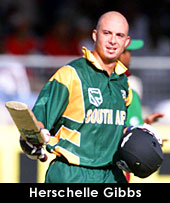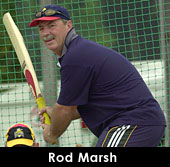Lots of smoke, but where's the fire?
Daniel Laidlaw
International cricket has many problems, not least of which is the match-fixing scourge. In addition to that insidious threat, players are also responsible for giving the game a distasteful image through excessive sledging, appealing, and off-field public misbehaviour. The private use of recreational drugs, however, does not fall under any one of those categories in terms of adverse impact on the game.
 Recently it was revealed that South Africans Herschelle Gibbs, Roger Telemachus, Paul Adams, Justin Kemp, Andre Nel and Craig Smith were fined around US $1,250 each by South Africa's touring Misconduct Committee, comprising senior players and team management, for a drugs incident that occurred a month earlier. The five players, and physio Smith, were disciplined for smoking marijuana while celebrating South Africa’s historic Test series victory.
Recently it was revealed that South Africans Herschelle Gibbs, Roger Telemachus, Paul Adams, Justin Kemp, Andre Nel and Craig Smith were fined around US $1,250 each by South Africa's touring Misconduct Committee, comprising senior players and team management, for a drugs incident that occurred a month earlier. The five players, and physio Smith, were disciplined for smoking marijuana while celebrating South Africa’s historic Test series victory.
Of all the evils to beset cricket, who would have thought drugs would be one of them? Just last month, Australian cricketer Duncan Spencer was suspended for 18 months for taking the prohibited performance-enhancing drug, Nandrolone. The benefits of performance-enhancing drugs for cricketers are dubious, at best. Fortunately, unlike other sports, cricket is not a game requiring speed and power in a condensed period of time, otherwise you can bet it would be among those sports plagued by this issue. Nevertheless, no one is allowed to gain even the slightest advantage in this area and Spencer was duly punished.
Now we have Gibbs and company smoking dope, in cricket’s first genuine drugs scandal. Some would view it as a similar offence to Spencer’s. However, since there is no performance benefit to be gained from recreational drugs, it is highly questionable whether cricket authorities should have the right to fine players for using them. If the use of drugs takes place in public, or adversely affects a player’s performance, then a cricket board certainly has a duty to take action because it reflects poorly on the game. But the South Africans in this incident were in the privacy of their hotel room, after the fourth Test had been completed.
It is time to ponder how much power cricket authorities should wield over players.
Like any other lifestyle decisions a player chooses to make that do not detract from his profession, use of recreational drugs is a personal issue unrelated to playing cricket. It’s a question of rights. Should a cricket board have the authority to fine players for, say, speeding or other such legal misdemeanours? Depending on your social viewpoint, drugs are a much more serious issue, but no more within a cricket board’s jurisdiction when they bear no relation to the sport and the way it is perceived.
Rulings of “conduct unbecoming” or the old euphemism “bringing the game into disrepute” can only be invoked when indiscretions occur in public. Yes, cricketers may have it written in their contracts that they agree not to use any illegal drugs, in which case a board has a right to punish them. But should they even have to agree to such a clause?
It was laughable to read, in the South African media release, Herschelle Gibbs and co express their “remorse” for what was a “one-off incident”. Remorse that they were caught, maybe, but surely not for something they would have known had no relation to their cricket or the game’s image, until it was publicised.
Players are routinely seen celebrating with copious amounts of alcohol after a match, which in most places is accepted as part of the culture of cricket. Since players are not fined for drinking excessively after a victory, what makes this all that different?
Interestingly, the list of those who smoked dope included team physiotherapist Craig Smith. If the physio, presumably responsible for maintaining the health and fitness of the players, had no qualms with it, then the players can hardly be singled out for trying it either.
However seriously the issue is treated publicly, you can bet a lot of other cricketers, both past and present, would be laughing. It’s somewhat similar to being struck on the protector -- it’s funny because it’s not you. Nobody would be foolish enough to believe the South Africans in question are the first or last cricketers to try ganja while touring the West Indies. The only difference in this case was that it was unfortunately made public.
If South Africa were serious about this issue, the United Cricket Board would have been contacted immediately and Gibbs, serving a suspended sentence for a prior misconduct charge, would have been suspended forthwith. But clearly they are not, and understandably so.
To think convicted match-fixer Gibbs could be suspended for this minor drugs affair, while receiving a ban of just six months for his involvement in match-fixing, is appalling considering the disparity of the offences. If the UCB reacts severely to this, then it only leaves itself open to ridicule.
 Also, the hypocrisy present in parts of the cricket world is a joke. I listened with incredulity to an interview once conducted with Australian Cricket Academy head coach Rod Marsh as he explained, with a straight face, how alcohol was beneficial because it helped players to relax and communicate better with each other after a match, while at the same time condemning illegal drugs as totally unacceptable.
Also, the hypocrisy present in parts of the cricket world is a joke. I listened with incredulity to an interview once conducted with Australian Cricket Academy head coach Rod Marsh as he explained, with a straight face, how alcohol was beneficial because it helped players to relax and communicate better with each other after a match, while at the same time condemning illegal drugs as totally unacceptable.
Apparently it is all right for players to get blindingly drunk, but not to take an illegal substance with considerably less harmful affects. The difference in standard is purely legal, which surely should be settled by law and not through cricket board interference.
On a slightly different note, it came as no surprise whatsoever to see the name of Herschelle Gibbs on the list of marijuana miscreants. The convicted match-fixer -- a term that, bizarrely, TV commentators seem loathe to use, often preferring instead to make vague euphemistic references to his time out of the game -- has also been in trouble previously. Given his record, he has substantially more to lose by this than the others involved.
Interestingly, South Africa’s Misconduct Committee comprised management and senior players, none of whom were on the list of those trialling some West Indian herb. A Misconduct Committee can’t very well investigate itself, can it? Senior players seem to be automatically presumed virtuous, when we know that is not necessarily the case. That makes it entirely inappropriate for them to handle such matters. If the touring party did deem the affair serious, it should have gone straight to the UCB for adjudication.
Mail Daniel Laidlaw